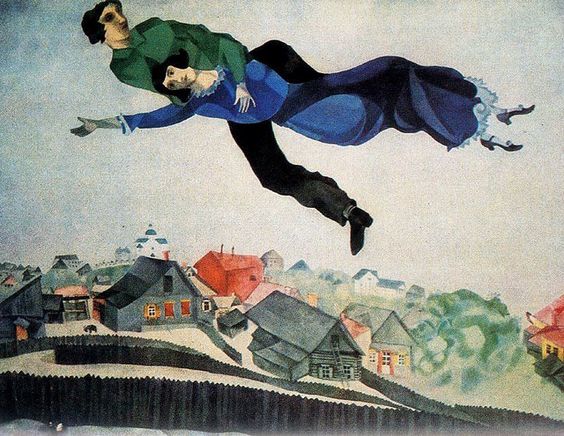Max Ernst
Eduard Bagritsky
(1895-1934)
Я сладко
изнемог от тишины и снов,
От скуки
медленной и песен неумелых,
Мне любы
петухи на полотенцах белых
И копоть
древняя суровых образов.
Под
жаркий шорох мух проходит день за днем,
Благочестивейшим
исполненный смиреньем,
Бормочет
перепел под низким потолком,
Да
пахнет в праздники малиновым вареньем.
А по
ночам томит гусиный нежный пух,
Лампада
душная мучительно мигает,
И, шею
вытянув, протяжно запевает
На
полотенце вышитый петух.
Так мне,
о господи, ты скромный дал приют,
Под
кровом благостным, не знающим волненья,
Где дни
тяжелые, как с ложечки варенье,
Густыми
каплями текут, текут, текут.
1919
Literal Translation
Silence and dreams, and a
languid boredom
Have left me sweetly
enervated,
I’m fond of the roosters on
white dishtowels
And of ancient soot on austere
icons.
Day after day goes by to the
hot rustle of flies,
Each day replete with the
most pious humility,
A quail murmurs beneath the
low ceiling,
And on festive days there’s
the aroma of raspberry jam.
And at night you languish in
soft goose-down feathers,
The stifling icon lamp blinks
agonizingly,
And the embroidered rooster
on the dishtowel
Stretches out his neck and
crows at length.
And so, O Lord, you’ve given
me a modest hideaway,
Beneath a soothing roof that
knows not agitation,
Where the heavy [oppressive]
days, as jam from a spoon,
In thick droplets go
dripping, dripping, dripping.
Literary Translation/Adaptation
by U.R. Bowie
So sweetly enervated I, by
silence and by dreams,
By boredom creeping slowly past,
and songs ineptly sung,
I love the crowing roosters
on the dishtowel barnyard scenes,
The ancient soot on icons, in
the parlor corner hung.
Day follows day, the flies
toil on, exacerbating rustle,
My life abounds with piety, with
actions cautionary,
Beneath the placid eaves above
the cooing pigeons bustle,
On festive days the air is
rife with jam of lingonberry.
With night’s unease I turn
and writhe in goose-down feathers soft,
The stifling icon lamp’s
aglitter, blinking misery,
Then one embroidered rooster in
the dishtowel barnyard loft
Extends his scrawny neck,
exults, and crows his reveille.
O Lord, thou hast provided me
a modest warm cocoon,
Beneath a tranquil roof that
holds my life in trusteeship,
Where day by viscous day seeps
by, as jam from kitchen spoon,
In thick and gooey droplets
falls,
With drip, and drip, and
drip.
Translator’s Notes
Biographical Information on Bagritsky, from the Internet
(Translation of Highlights Here, Full Text in Russian Below)
Eduard Georgievich Bagritsky, whose real surname was Dzjubin or Dzjuban),
was born on October 22 (Nov. 3, NS), 1895, in Odessa to a Jewish family that practiced
its religion seriously. He studied to be a land surveyor but never worked at
that profession.
Beginning in 1915, he published his verses under various pseudonyms,
both male and female (Eduard Bagritsky, Nina Voskresenskaja), and soon he had become
one of the most remarkable of the young Odessa writers who were later to be stars
in the pantheon of Soviet Literature: Yury Olesha, Ilya Il’f, Valentin Kataev,
Vera Inber, and others.
In 1918 he joined the Red Army during the Civil War, working in
the political arm of the partisan movement, writing politically motivational
verses. After the war he worked in Odessa as a poet and artist, publishing his
works in newspapers and humor magazines under various pseudonyms: A Guy Named
Vasya, Nina Voskresenskaja (again), and The People’s Correspondent Gortsev.
In 1925 he moved to Moscow and joined various literary circles
then in mode, including the Constructivists. In 1928 his verse collection
titled “Southwest” came out, and a second collection, “The Victors,” appeared in
1932.
Beginning with the year 1930 his asthma intensified—a disease
from which he had suffered since childhood; he died on February 16, 1934, in
Moscow. His widow, Lidia Suok, was arrested in 1937 and sent to a labor camp;
she was released only in 1956. Their son Vsevolod fought in The Great Patriotic
War (WW II), died at the front in 1942.
dddfffffffffddddddddd
Эдуард Георгиевич Багрицкий (настоящая
фамилия Дзюбин (Дзюбан); 1895—1934) — русский поэт, переводчик и драматург,
родился 22 октября (3 ноября) 1895 г. в Одессе в буржуазной еврейской семье с
сильными религиозными традициями. Окончил землемерные курсы, но по профессии не
работал.
С 1915 г. под псевдонимом «Эдуард
Багрицкий» и женской маской «Нина Воскресенская» начал публиковать свои стихи в
одесских литературных альманахах и вскоре стал одной из самых заметных фигур в
группе молодых одесских литераторов, впоследствии ставших крупными советскими
писателями (Юрий Олеша, Илья Ильф, Валентин Катаев, Лев Славин, Семён Кирсанов,
Вера Инбер).
В 1918 г., во время Гражданской войны,
добровольцем вступил в Красную Армию, работал в политотделе особого
партизанского отряда имени ВЦИК, писал агитационные стихи.
После войны работал в Одессе, сотрудничая,
как поэт и художник, в ЮгРОСТА (Южное бюро Украинского отделения Российского
телеграфного агентства) вместе с Ю. Олешей, В. Нарбутом, С. Бондариным, В.
Катаевым. Публиковался в одесских газетах и юмористических журналах под
псевдонимами «Некто Вася», «Нина Воскресенская», «Рабкор Горцев».
В 1925г. Багрицкий приехал в Москву и стал
членом литературной группы «Перевал», через год примкнул к конструктивистам. В
1928г. у него вышел сборник стихов «Юго-запад». Второй сборник, «Победители»,
появился в 1932г.
С начала 1930г. у Багрицкого обострилась астма — болезнь, от которой он страдал с детства.
Он умер 16 февраля 1934г. в Москве. Вдова поэта, Лидия Густавовна Суок, была
репрессирована в 1937 (вернулась из заключения в 1956). Сын Всеволод погиб на
фронте в 1942 г.





